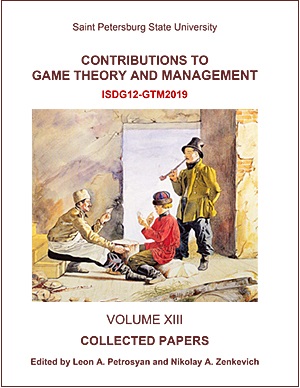Opinion Control in a Team with Complete and Incomplete Communication
DOI:
https://doi.org/10.21638/11701/spbu31.2020.17Abstract
We examine the influence of management of the opinion of a group members, while the group of agents are considered with different communication structures. We consider the optimization problem in dynamics with feedback information structure. In the model, the communication structure plays an important role since not all agents are directly connected with each other. The influence of the agents on each other is taken into account in the equation of dynamics of agents' opinions. An agent weights the other agents' opinions and after that forms the next step opinion. Two types of communication structures are considered in the model. The results of numerical modeling illustrate the influence of some parameters of the model (control, influence power of agents on each other) on the optimal opinion dynamics.
Keywords:
opinion dynamics, average opinion, feedback optimal control, Bellman function
Downloads
References
Downloads
Published
How to Cite
Issue
Section
License
Articles of "Contributions to Game Theory and Management" are open access distributed under the terms of the License Agreement with Saint Petersburg State University, which permits to the authors unrestricted distribution and self-archiving free of charge.




